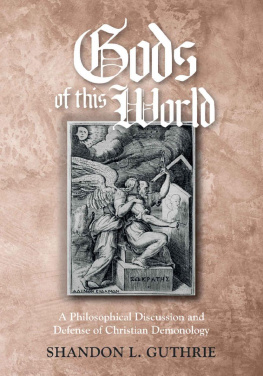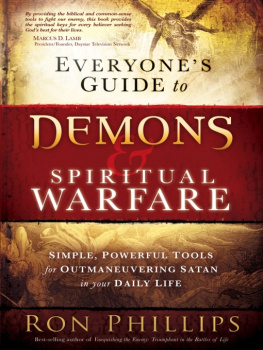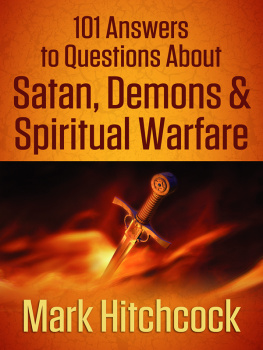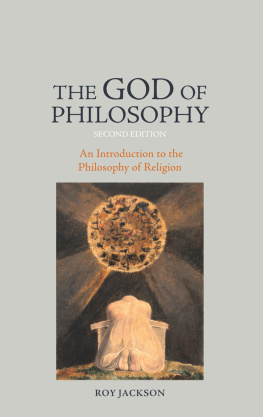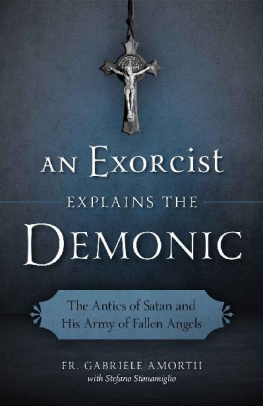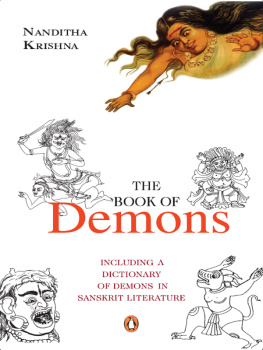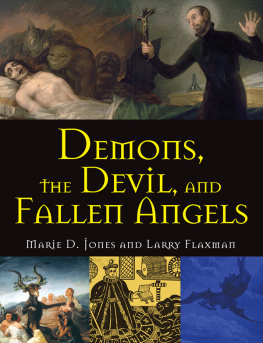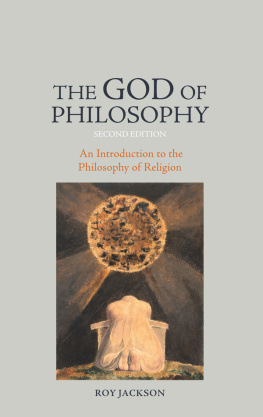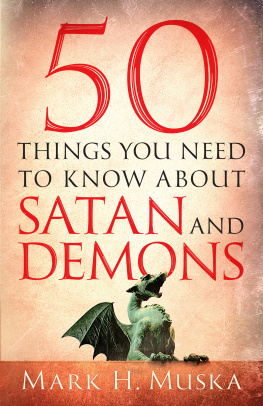Gods of this World
A Philosophical Discussion and Defense of Christian Demonology
Shandon L. Guthrie
Gods of this World
A Philosophical Discussion and Defense of Christian Demonology
Copyright 2018 Shandon L. Guthrie. All rights reserved. Except for brief quotations in critical publications or reviews, no part of this book may be reproduced in any manner without prior written permission from the publisher. Write: Permissions, Wipf and Stock Publishers, W. th Ave., Suite , Eugene, OR 97401 .
Pickwick Publications
An Imprint of Wipf and Stock Publishers
W. th Ave., Suite
Eugene, OR 97401
www.wipfandstock.com
paperback isbn: 978-1-5326-3304-1
hardcover isbn: 978-1-5326-3306-5
ebook isbn: 978-1-5326-3305-8
Cataloguing-in-Publication data:
Names: Guthrie, Shandon L., author.
Title: Gods of this world : a philosophical discussion and defense of Christian demonology / Shandon L. Guthrie.
Description: Eugene, OR : Pickwick Publications, 2018 | Includes bibliographical references and index(es).
Identifiers: isbn 978-1-5326-3304-1 ( paperback ) | isbn 978-1-5326-3306-5 ( hardcover ) | isbn 978-1-5326-3305-8 ( ebook )
Subjects: LCSH: Demonology. | AngelsChristianityHistory of doctrines. | DemonologyHistory of doctrines.
Classification: BL480 .G85 2018 ( print ) | BL480 .G85 ( ebook )
Manufactured in the U.S.A. 01/25/19
Scripture quotations, unless otherwise noted, are from The ESV Bible (The Holy Bible, English Standard Version), copyright 2001 by Crossway, a publishing ministry of Good News Publishers. Used by permission. All rights reserved.
Other Scripture quotations are from the Revised Standard Version of the Bible, copyright 1946 , 1952 , and 1971 Division of Christian Education of the National Council of the Churches of Christ in the USA. Used by permission. All rights reserved.
Table of Contents
To my wife, Shelli, whose love has possessed me for over twenty wonderful years.
Acknowledgments
A leading note of gratitude goes out to my former doctoral supervisor at Manchester Metropolitan University, Dr. Lloyd Strickland, for his guidance, challenging criticisms, and support of this project from its inception to its fruition. It was his scholarly interactions with my work that made much of it what it is today. Thanks also go to my former doctoral examiners, Dr. Charles Taliaferro and Dr. Christopher Partridge, for some helpful feedback and encouragement over the ramifications of this research. I would also like to thank Jordan Fishel and Jason Valentine for our many hours of stimulating conversation over the seminal ideas that ultimately gave impetus to the book now in your hands. Both of them encouraged me unequivocally to take on this research. I must also thank Dr. Alan Rhoda, a fine scholar, colleague, and friend, for some insightful challenges and thoughts he added to the subject.
The feedback that I received from papers delivered at meetings of the Society of Christian Philosophers in relation to some of the content of this book was invaluable as well as inspiring. Even in the hallways after my presentations, I was always moved by how many philosophers and theologians voiced an appreciation for the work this book embodies. I also benefited from conversations on the subject with a number of students from my philosophy of religion courses that I taught at Regis University. All of the sound reasoning and discussions in this book are surely the product of the refinements made by those with whom I have been acquainted over the years. But any poor reasoning and ineptly crafted ratiocinations that remain are surely my own, and I take full responsibility for any of this books deficits.
From non-philosophical quarters, I have been encouraged by local college ministries that allowed me to share with them a more palatable and distilled version of some of the core arguments of this book. They received it well and, through various challenges and inquiries thrown at me, revealed the desperate need for someone to communicate on this topic from a philosophical point of view. Also, the engaging dialogues I had with sundry pastors, ministers, educators, and countless parishioners underscored the fact that this subject has been neglected and grossly misunderstood for far too long. It is due to the motivations derived from these numerous interactions that I can confidently say that the days of neglect are now over.
Perhaps no greater support has been offered to me than that of my wife, Shelli, who loved and supported me during the entire development of this book. She has been my conscience and my anchor during times when I did not believe in myself. She is indeed the love of my life and I am forever grateful for her. I have also benefited in unexpected ways from our children, Alexander, KatieAnn, and Rebekah. They made it possible for me to disengage from the stress of daily research in order to enjoy the moment.
[T]he main part he will not understand, another part he will not believe, and the rest he will laugh at
Immanuel Kant ( Dreams of a Spirit-Seer )
Introduction
Demonology: A Doctrine in Disarray
A ngelology and its filial by-product, demonology , have long been subjects on the fringe of serious intellectual investigation within, inter alia , the field of philosophy; and they have done so with very few historical exceptions. Perhaps this is due to the exotic, speculative, and unscientific nature of talk of spirit beings like those in the ideations of angels and demons. The notions themselves bear the unmistakable stench of mythology that further make them matters too obsolete for the scientist or historian and too archaic for the philosopher. Not surprisingly, these areas of inquest have been relegated to the specialized discipline of pneumatology in strictly theological quarters. With the advent of modernity and its contribution to metaphysics that the universe is but a world-machine, disenchanted members of the clergy were finding increasingly fewer places in our universe for the continued operations of angels and demons. At the later christening of psychology and psychiatry as sciences of the mind, talk of mental disorders and other psychodynamic factors finally buried the idea that ones conscience was in part guided or manipulated by external spiritual forces beyond the material realm.
The recycled tongue-in-cheek question, How many angels can dance on the head of a pin? is often a clichd reminder that intellectual discussions about things like angels can never be, so we are told, resolved from the standpoint of discursive reasoning. There is no doubt that demonology, as more or less the delimited study of deviant angels (or their offspring), is unarguably a far more vilified discipline than its adjoining cousin. Yet many detractors in the contemporary world are ill-informed about what angels and demons are and on what grounds one has to think that they exist despite the funereal pronouncements of the intelligentsia. No doubt the cynic will find demonology to be inherently laughable such that the shock of merely uttering its tenets aloud becomes its own refutation. Yet the believers response is often no better, for she simply retreats to the safe confines of her intimate cliques and fellowships wherein the mutual exchange of such ideas can be insulated from the scoffs of naysayers and critics. Its the academic equivalent of an unrelenting trench warfare. Accordingly, neither the skeptic nor the believer has the intellectual upper hand.
But it gets even worse for twenty-first-century adherents. A number of religious people who pontificate on the subject invariably derive their doctrinal material from less-refined, casual sources like sermons from ones local gathering, popular-level books on spiritual warfare, and even from vehicles of entertainment including movies, television shows, and novels. In fact, talk of literal demons in the Western world today owes much of its conceptual grooming to literary classics such as Dante Alighieris Divine Comedy (), Heinrich Kramers Malleus Maleficarum ( 1487 ), the fanciful stories in the sixteenth century of the fictional Dr. Faustus, and the unparalleled epic of John Miltons Paradise Lost ( 1667 ). These works have led to the modern caricaturing of Satan and his demons as human gremlins dawning goatees, pitchforks, and red union suits who gleefully dish out hellfire judgment to societys most egregious offenders. It is doubtful whether the average person even knows where an official canonized demonology ends and a fictional depiction of demons begins.

